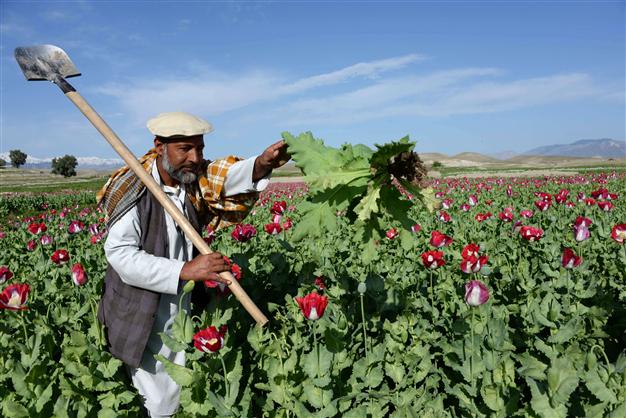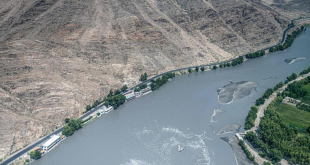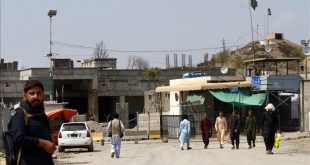By Farhad Naibkhel-KABUL: Ministry of Counter Narcotics in joint venture with the United Nations Office for Drug and Crimes (UNODC) on Wednesday released the 2017 survey saying the areas under opium poppy cultivation increased by 63 percent across the country.
“The total area under poppy cultivation in Afghanistan was estimated at 328,000 hectares in 2017, a 63 percent increase from 127,000 hectares more compared to 2016,” said Jawid Ahmad Qaim, Plan and Policy Deputy of Ministry of Counter Narcotics.
He said that Potential opium production was estimated at 9,000 tons in 2017, an increase of 87percent from its 2016 level (4,800 tons) the increase in production is mainly result of an increase in area under opium poppy cultivation, increase in poppy yield per hectare also contributed. In 2017, the average opium yield amounted to 27.3KG per hectare, which was 15 percent higher than in 2016.
According to report this level of opium poppy cultivation is a new record high and exceeds the formerly highest value recorded in 2014 (224,000 hectares) by 104,000 hectares or 46%.
He said that the majority 60% of cultivation took place in south of the country and western region accounted for 17, north region for 13 and eastern region for 7 percent.
Finding of the Survey revealed that accounting for 57% of national production the southern region continued to produce the vast majority of opium in Afghanistan followed by north with 16% and west 13% and east only 9 percent, he added.
“Strong increases” were observed in almost all major poppy cultivating provinces. Only in Helmand alone cultivation increased by 63,700 hectares or 79 percent which account for about half of the total national increase. Strong increases were observed also in Balkh +10,000 Hectares or almost five times more than 2016. Also it was increased in Kandahar, Nimrwz and Uruzgan as well.
Helmand remained the country’s major opium poppy cultivating province with a third of the arable land dedicated to opium poppy, followed by Kandahar, Badghis, Faryab, Uruzgan, Nangarhar, Farah, Balkh, Nimrwz and Badakhshan.
In 2017, Ghazni after two decades 1995, Samangan and Nuristan provinces lost their poppy free status and reduced the poppy free provinces number from 13 to 10 in the country.
In 2017, 750 hectares opium poppy was eradicated in 14 provinces compared to 355 hectares in 7 provinces in 2016. Six lives were lost and eight injured comparing to 8 killed and 7 injured in 2016.
Report said that although there is no single reason for the massive increase in opium poppy cultivation but rule of law related challenges, such as political instability, lack of government control and security as well as corruption has been found to be the main drivers of illicit cultivation as well as economic problems of farmers also contributed to this.
Addressing the opiate problem in Afghanistan remains a shared responsibility. Only a small share of the revenues generated by the cultivation and trafficking of Afghan opiates reaches Afghan drug trafficking groups. Many more billions of dollars are made from trafficking opiates into major consumer markets, mainly in Europe and Sais, said the report.
At almost US$ 1.4 billion (1.2 – 1.5 billion), equivalent to roughly 7% of Afghanistan’s estimated GDP, the farm-gate value of opium production increased by 55% in 2017 as compared to past year, added the report.
Counter Narcotics Deputy also believed that narcotics and terrorism linked with each other.
He said plans are under way to eradicate poppy cultivation, but still lack of facility particularly decrease of international community assistance in the aspect impede the counter narcotics drives, thus it is required of all donors and relevant organs to help the ministry in this regard.
Pointing to precursor smuggling from abroad to Afghanistan, he said that we don’t need precursor and never produce in Afghanistan; it is smuggling from abroad which the region country must take measure for solution.
Counter Narcotics Deputy of Ministry of Interior Abdul Khalil Bakhtyar said that “counter narcotics police have conducted 2343 anti-drug operations, which through arrested 2647 smugglers including eight big smugglers in the past one year.”
He said that 64 public staffs including police and army were among arrested people.
He said that 50 opium laboratories destroyed during operations.
Meanwhile Mark Colhoun Country Director for UNODC said that the free poppy cultivation decreased from 14 provinces to 10 provinces.
He said that more agriculture land cultivated poppy.
He insisted over cooperation with the organs have worked well as well as a better combat against money laundry in order to overcome challenges.
He said that UNODC will remain committed with the government of Afghanistan in combat against narcotics in Afghanistan.
 Afghanistan Times Latest News and Analysis from Afghanistan and the Region
Afghanistan Times Latest News and Analysis from Afghanistan and the Region




